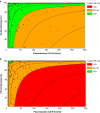Carbohydrate antigen 19-9 (CA19-9) response after induction FOLFIRINOX for locally advanced pancreatic cancer identifies patients who may benefit from surgical exploration: multicentre, observational cohort study
- PMID: 39967445
- PMCID: PMC11836430
- DOI: 10.1093/bjs/znaf011
Carbohydrate antigen 19-9 (CA19-9) response after induction FOLFIRINOX for locally advanced pancreatic cancer identifies patients who may benefit from surgical exploration: multicentre, observational cohort study
Abstract
Background: Which patients with locally advanced pancreatic cancer may benefit from surgical exploration after induction treatment remains debated. The aim of this retrospective cohort study was to identify independent factors for overall survival after surgical exploration for locally advanced pancreatic cancer, which are available at restaging after induction therapy.
Methods: Consecutive patients with locally advanced pancreatic cancer from the Trans-Atlantic Pancreatic Surgery cohort who underwent surgical exploration after FOLFIRINOX as induction chemotherapy were included. Multivariable Cox proportional hazards analyses with contour plots were used for the predicted 3-year overall survival in patients who underwent surgical exploration.
Results: Overall, 958 patients with locally advanced pancreatic cancer were treated with FOLFIRINOX as induction therapy. At restaging, 221 patients (23.1%) had metastatic disease (M1) and 724 patients (75.6%) did not have metastatic disease (M0)-234 patients (24.4%) with M0 disease underwent surgical exploration and 490 patients (51.1%) with M0 disease did not undergo surgical exploration; restaging information was not available for 13 patients (1%). The surgical exploration cohort included 213 patients with locally advanced pancreatic cancer, after excluding 21 carbohydrate antigen 19-9 non-producers. The independent prognostic factors for overall survival after surgical exploration were post-induction carbohydrate antigen 19-9 level (HR 1.14 (95% c.i. 1.01 to 1.29)), carbohydrate antigen 19-9 decrease (HR 0.89 (95% c.i. 0.79 to 0.99)), and a WHO performance status of greater than or equal to one (HR 1.71 (95% c.i. 1.21 to 2.42)). Baseline carbohydrate antigen 19-9 was not prognostic for overall survival after surgical exploration (HR 0.98 (95% c.i. 0.90 to 1.07)). The best predicted 3-year overall survival was achieved with a greater than 80% decrease in carbohydrate antigen 19-9 and a post-induction carbohydrate antigen 19-9 less than 50 U/ml.
Conclusion: Carbohydrate antigen 19-9 after induction therapy, carbohydrate antigen 19-9 decrease, and performance status are independent prognostic factors for overall survival after surgical exploration for locally advanced pancreatic cancer. Three-year overall survival is best in patients with a performance status of zero, a greater than 80% decrease in carbohydrate antigen 19-9, and a post-induction carbohydrate antigen 19-9 level less than 50 U/ml.
© The Author(s) 2025. Published by Oxford University Press on behalf of BJS Foundation Ltd.
Figures



References
-
- Mizrahi JD, Surana R, Valle JW, Shroff RT. Pancreatic cancer. Lancet 2020;395:2008–2020 - PubMed
-
- National Comprehensive Cancer Network . NCCN Clinical Practice Guidelines in Oncology: Pancreatic Adenocarcinoma (Version 1.2024) 2024 (Updated 13 December 2023). https://www.nccn.org/professionals/physician_gls/pdf/pancreatic.pdf (accessed 15 August 2024)
-
- Konstantinidis IT, Warshaw AL, Allen JN, Blaszkowsky LS, Fernandez-del Castillo C, Deshpande V et al. Pancreatic ductal adenocarcinoma: is there a survival difference for R1 resections versus locally advanced unresectable tumors? What is a “true” R0 resection? Ann Surg 2013;257:731–736 - PubMed
-
- Strobel O, Hank T, Hinz U, Bergmann F, Schneider L, Springfeld C et al. Pancreatic cancer surgery. Ann Surg 2017;265:565–573 - PubMed
-
- Mollberg N, Rahbari NN, Koch M, Hartwig W, Hoeger Y, Buechler MW et al. Arterial resection during pancreatectomy for pancreatic cancer: a systematic review and meta-analysis. Ann Surg 2011;254:882–893 - PubMed
Publication types
MeSH terms
Substances
Grants and funding
LinkOut - more resources
Full Text Sources
Medical

